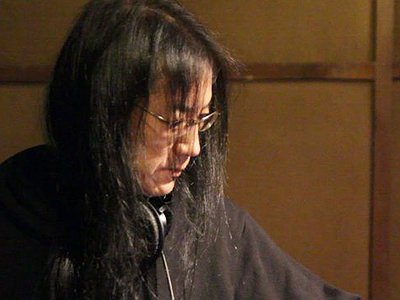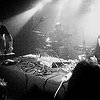When did you start writing/producing music - and what or who were your early passions and influences?
I started playing music around 1972. I was playing drums, in a kind of blues rock band influenced by Cream, Jimi Hendrix, etc at some local studios with my high-school friends. After a while, around 1973, we gradually moved towards playing improvisation. I've been playing with Kiyoshi Mizutani since then. We were profoundly affected by King Crimson's Earthbound, Albert Ayler's Bells and Velvet Underground's White Light/White Heat.
Later, our interests shifted to free music such as ICP, FMP and INCUS. We wanted to break out from the field of rock. I felt I reached a dead end just playing instruments so I quit playing and tried other things like tapping the floor of the studio or rattling the chairs.
Quitting something is so thrilling to me, because it tells me what's important. At that time, I was struck by Pierre Schaeffer's Symphonie pour un Homme Seul, also influenced by Lou Reed's Metal Machine Music, Xenakis' Electro-Acoustic Music, Walter Marchetti's Homemade Electric Music, and the poetry of Dadaism and Surrealism. All of this led me to making music only by noises and sounds generated solely by non instruments. This was the birth of MERZBOW.
What do you personally consider to be the incisive moments in your artistic work and/or career?
The moment when some sounds meet to produce unexpected beauty that cramps your mind like 'the chance meeting on a dissecting-table of a sewing-machine and an umbrella!'
What are currently your main compositional- and production-challenges?
Last year I released lots of retrospective box sets such as Merzphysics, Merzmorphosis, Merzbient , Lowest Music & Arts and Merzbow Duo. Listening to these past works was very exciting and rewarding. Actually, I pulled out many old bits of gear and equipments from the closet. I wanted to use them again and I tried to recall the memories of the processes creating the sounds back then. Recently I unexpectedly found some violin bow I used, hidden in the corner of my desk, and came up with an idea of using string instruments on my new album UZUMEKU(LP). Also I repaired EMS SYNTHI 'A'. Actually, I am playing it now in my gigs.
What do you usually start with when working on a new piece?
It's on request. I'll start with it.
How strictly do you separate improvising and composing?
Actually I don't pay much attention to the difference between them. For convenience's sake, I use a term - composing for my work, but it's not accurate. Because my pieces are not composed as ordinary music, but are rather like an abstract rendezvous of various sounds happening and/or prepared.
How do you see the relationship between sound, space and composition?
It's always so thrilling to see what emerges after collisions of various sound elements. In the case of my work, I put an emphasis on how to combine or disrupt stillness and motion, construct a composition as it grows. Successful, if those elements bring tensions, otherwise it'd become plain and boring.
Do you feel it important that an audience is able to deduct the processes and ideas behind a work purely on the basis of the music? If so, how do you make them transparent?
I don't think it's possible to deliver my ideas and the thoughts behind my music accurately. As a matter of fact, it is not necessary to pass any statements to the others. Music is perceived intuitively on presence, and that's the way it should be.
In how much, do you feel, are creative decisions shaped by cultural differences – and in how much, vice versa, is the perception of sound influenced by cultural differences?
It's true that my work is influenced by the culture I belong to, but when I'm creating music, I've never thought of that. I love some part of Japanese culture, but there are some I can't stand. I don't agree to the idea that all of the traditional cultures should be maintained. For instance, I think vicious customs like whaling in the Antarctic Ocean for scientific research, in the name of protecting traditional Japanese food culture, must be stopped.



